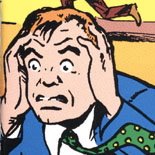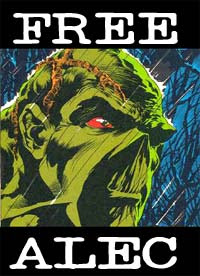Setting the Time
On Lorendiac's LiveJournal, he lists the nine categories of continuity for an ongoing superhero story. It's an excellent list and very useful for understanding the context in which most stories are written.
If I may be so bold, I'd like to add an addendum to Category #3, "Continuity of Environment", which basically states that stories about particular characters need to take place in specific locations. I.e., Batman stories are set in Gotham, a major city located somewhere in the northeast United States. If Batman is out of Gotham in any particular story, you almost have to explain why he's not in Gotham.
My addendum is that, on top to continuity of a physical environment, there is also a continuity of temporal environment. Stories about a particular character are also set in a particular era, and for superheroes, that era is always "the present."
And anyone who has ever used the phrase "sliding timeline" in casual conversation immediately sees what the problem with that is.
To maintain continuity of personality (Category #2), to say that Batman is Bruce Wayne, the original Bruce Wayne who personally witnessed his parents' death and not someone else who happens to have the same name, we have to say that it's been only 12 or 13 years since he first put on the cape, instead of the 70 plus it's actually been in the real world. But to maintain continuity of setting, Batman has be operating in 2007, not 1952! But writers want their cake and eat it too, so time does pass but the character don't age, and if they won't push back the "current" date, they'll push forward the original one, indefinitely.*
Please understand that this is unusual. In any other genre or medium, the setting is either set by the original author as a specific point in the past, or at least remains the period in which it was originally written, because it is in their original setting that the characters make the most sense, and by maintaining continuity of setting we understand this to be the same character we've read about before.
For the most part, Sherlock Holmes stories are set in Victorian London, no matter when there were actually written. Tarzan stories are set in the turn of the century. Sgt. Rock stories are in World War II, Jonah Hex in the post-Civil War west. There are counter-examples to all of those cases but in every case you can feel it is the exception not of the rule. If a Sherlock Holmes movie were set in 2007, it would be called a bold updating. If a Batman story were set in 1939, it would be called an Elseworlds!
This works better for some characters than for others. Spider-Man, so far, is pretty timeless. The basics of his character, setting, and origin aren't particularly linked to the 1960s. And, sadly, the metaphors of prejudice and alienation are always going to be relevant for the X-Men.
But the Fantastic Four got their powers racing Communists into space, and the Incredible Hulk is the product of an nuclear bomb test in the Arizona desert. These are characters of their time, and to take them out of their time is to make them, to some degree, different characters! Frank Castle, Vietnam veteran, is a different character than Frank Castle, Gulf War veteran. (Or Iraq War, in a couple of years).
Maybe that's why Darwyn Cooke's New Frontier worked so well. Re-contextualizing Green Lantern, the Flash, and the Martian Manhunter as products of the late 1950s brings them to life as airmen ready to go to the stars, police using new science to make modern life better, and immigrants fearful of Red Scare xenophobia. And the Golden Age heroes, (Superman, Wonder Woman and Batman) look and act like relics of an earlier time, trying to redefine themselves for a new era.
In short, automatically setting your new story featuring an old character in "the present" without thinking of the consequences is dangerous. Some characters are going to fly through the years no problem. But, for the most part, characters just don't time travel that easy.
*An odd corollary of this is DC 1,000,000, the conceit of the crossover is we get to see the millionth issue of Detective Comics, starring a prison warden inspired by the legend of the Batman of the 20th Century. But this rings false because we know that if, miracle of miracles, DC Comics is still publishing one million months from now, the star of Detective Comics is still going to be Bruce Wayne!


